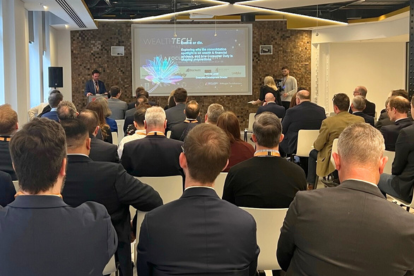Facilitator: Helen Clark, Mint Blue Consulting Expert: Andre Bastos, ALLFUNDS
Headlines:
- The wealth management software market is valued at £1-1.5 billion in the UK, driven by modernisation demands and generational shifts
- AI offers significant potential in meeting transcription, vulnerability detection, and client data analysis but requires robust privacy, security, and implementation strategies
- Balancing technology adoption with a client-centric approach is critical to maintaining trust and enhancing service delivery
Discussion points:
Introduction to Wealth Management Software Market
The market’s size (£1-1.5 billion) and growth potential was highlighted, driven by the need to replace legacy systems and meet demands for digitalisation from younger generations.
IT and information services account for a significant portion of financial institutions' expenses, which is concerning given decreasing margins.
Evolution of Banking Systems
The evolution from back-office systems in the 1990s to today’s modular core banking and front-end solutions.
Integrating these systems with new technologies, such as crypto and private markets, was identified as a major challenge.
Data Centralisation and Ecosystem Challenge
Delegates discussed the complexities of collecting, centralising, and managing data from various sources, including client and transaction data.
It was suggested that larger institutions might benefit from a 'best of breed' approach, while smaller firms could prefer 'one-stop shop' solutions.
AI Implementation in Financial Services
AI applications such as meeting transcription, vulnerability detection, and data analysis were highlighted as key areas of benefit.
Concerns about data security, privacy, and implementation challenges were raised, with participants stressing the importance of transparency and regular security audits.
Client-Centric Technology Adoption
The discussion emphasised aligning technological advancements with client needs, ensuring they enhance the client experience.
Participants noted the importance of maintaining personal relationships and trust alongside adopting new technologies.
Data Migration and System Integration
Data migration from legacy systems and integrating new platforms were described as resource-intensive and complex.
Thorough planning and quality assurance were emphasised as critical for successful implementations.
Key takeaways:
- Financial institutions should carefully consider whether a 'best of breed' or 'one-stop shop' approach is more suitable based on their size and operational requirements
- Implement robust privacy policies and encryption measures to secure meeting content and protect user data when using AI systems
- Ensure detailed privacy policies and clear data usage instructions are provided to build trust among users and clients
- Combine multiple AI models and conduct extensive training to enhance the accuracy of transcription and data comprehension
- Investigate the use of AI for real-time feedback and engagement during meetings to improve interactivity and outcomes
- Dedicate adequate time for proof-of-concept projects and ensure thorough testing to achieve desirable outcomes, particularly for smaller firms
- Leverage AI tools to extract valuable information from client documents and integrate it into CRM systems for more effective data management
- Carefully assess AI providers to ensure compliance with GDPR and maintain control over data ownership within the implementing organisation


